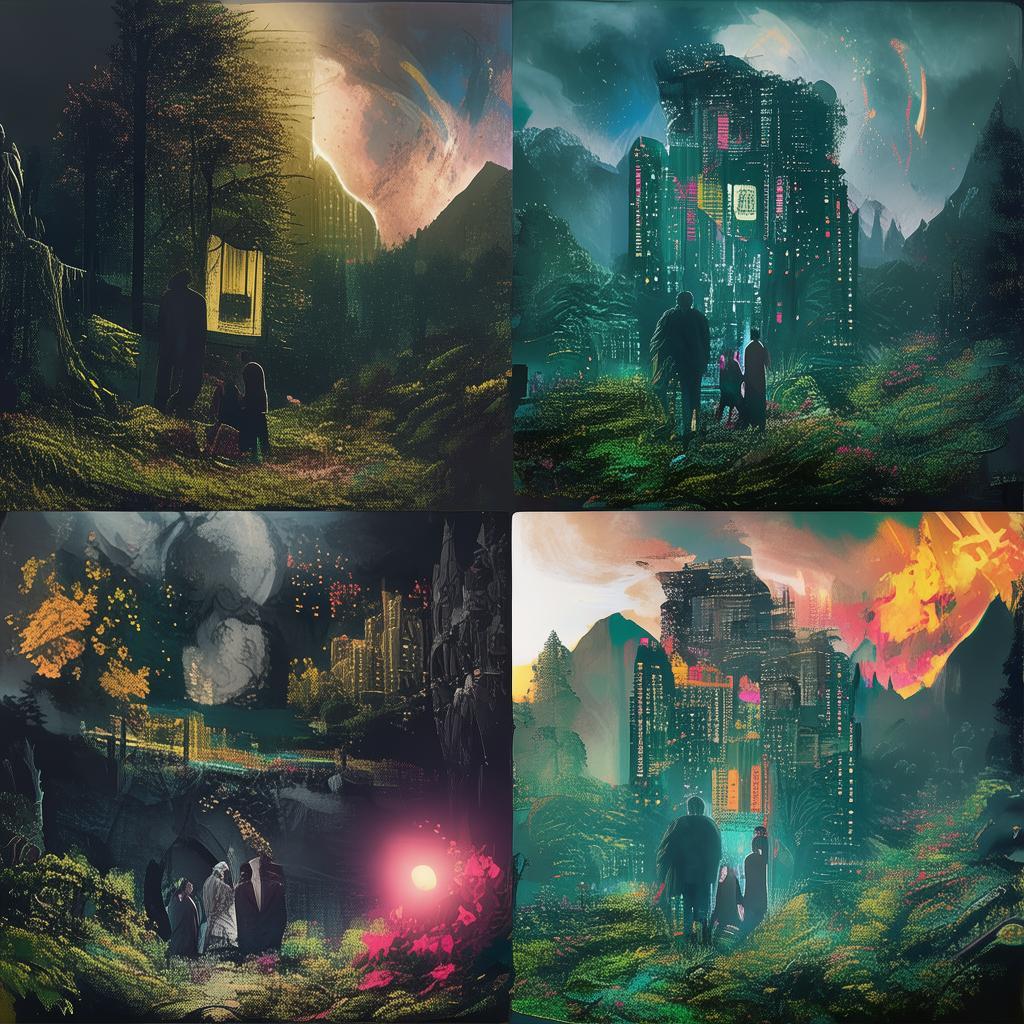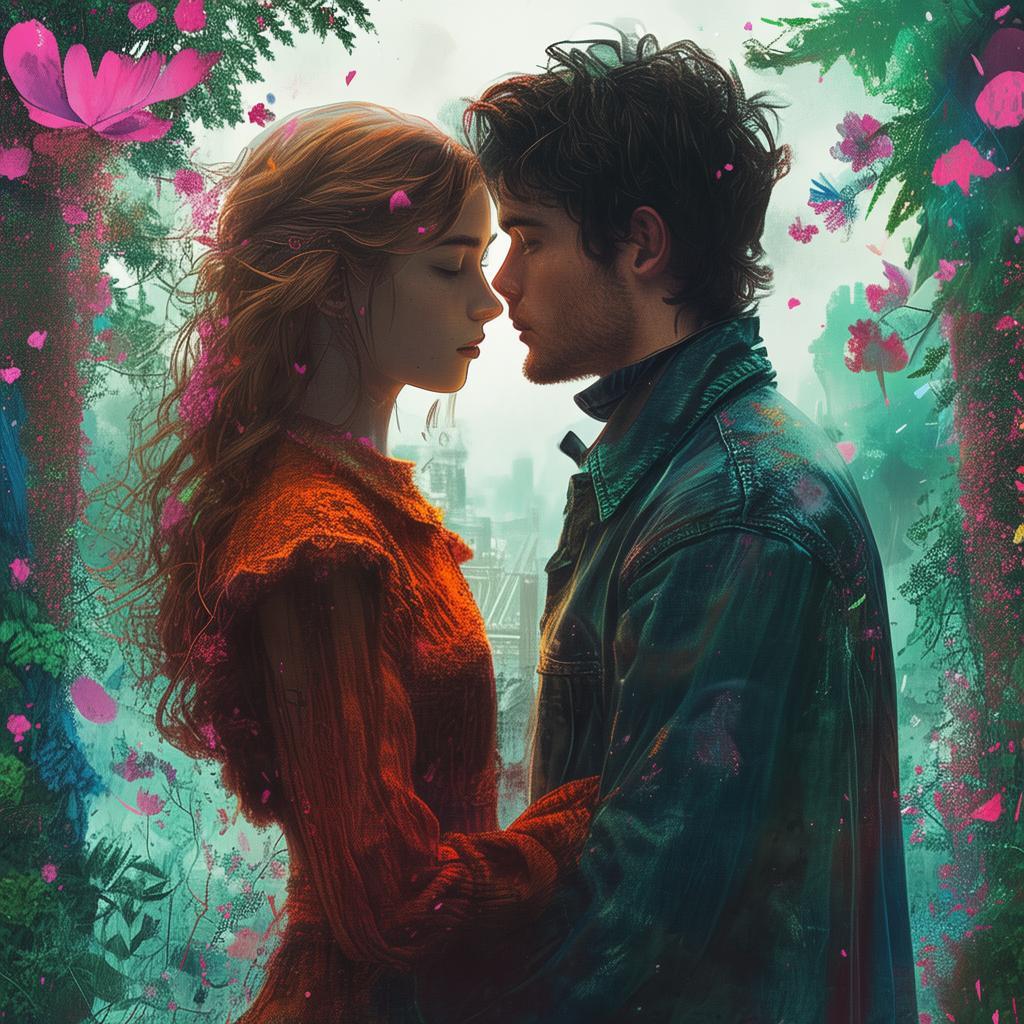Whispers in the Attic
The sun dipped below the horizon, casting long shadows across the sprawling mansion. The air was thick with anticipation as Emily stepped cautiously into the attic, the old wooden floorboards creaking under her weight. The room was dimly lit by a single, flickering candle, its flame dancing like a will-o'-the-wisp. On the far wall, a portrait of a stern-looking man watched over her with a piercing gaze.
Emily had always been drawn to the attic, a place of mystery and intrigue. It was here, amidst the dust and cobwebs, that she had discovered the hidden journal of the reclusive philosopher, Dr. Alexander Carlington. The journal, filled with cryptic notes and philosophical musings, had sparked an insatiable curiosity within her.
"Dear Diary," she began, her voice barely above a whisper, "today I discovered a secret that could change everything."
For years, Emily had been in love with Dr. Carlington, a man who had become a part of her life without ever realizing it. She had attended his lectures, soaked in his wisdom, and felt a profound connection to the man behind the teachings. But the truth was, he never knew her name, nor did he know the depth of her affection.
One evening, after a particularly engaging lecture, Emily found the courage to approach him. "Dr. Carlington," she said, her voice trembling with excitement, "I've been thinking about your work. It's changed my life."
The philosopher looked at her with a curious gaze. "Ah, young Emily," he replied, "I have noticed your interest. Tell me, what do you think of my ideas?"
For the next hour, they spoke of love, reality, and the nature of the universe. Emily felt a spark of something more intense than mere intellectual discourse. It was as if the air between them had been charged with electricity, a potent mixture of intellectual passion and forbidden love.
As the weeks passed, their meetings grew more frequent. Emily would sneak into the attic, where Dr. Carlington spent most of his time, and they would share their thoughts and dreams. The attic became a sanctuary for their forbidden love, a place where they could explore the depths of their souls without fear of judgment.
One evening, as they sat on the old wooden floor, Dr. Carlington turned to Emily with a serious expression. "Emily," he said, "there is something I must tell you. I am not who you think I am."
Panic surged through her. "What do you mean?"
"I am not a philosopher," he explained. "I am a scientist, a man who has discovered something extraordinary. My work is dangerous, and if anyone found out, I would be imprisoned or worse."
Emily's heart sank. "But what does this mean for us?"
Dr. Carlington took her hand in his. "It means we must be careful. If we are to continue our relationship, we must keep our secrets."
Their love was built on a foundation of secrets and lies. Emily knew that their love was dangerous, but she couldn't bear to let it go. She had become deeply invested in the man she thought she knew, and the thought of losing him was unbearable.
As the months passed, Emily and Dr. Carlington's love deepened, despite the dangers that loomed over them. They continued to meet in the attic, sharing their thoughts and dreams, and exploring the philosophical depths of their relationship.
One day, as they sat together, Emily felt a strange sensation. She looked at Dr. Carlington, who was staring intently at her. "What is it?" she asked.
"I think," he said, "that our love is more than just an emotional connection. It's a philosophical one, a merging of our minds and souls."
Emily nodded, tears streaming down her face. "I feel the same way."
As their love grew, so did their philosophical debates. They spoke of love, reality, and the nature of the universe, constantly challenging each other and pushing the boundaries of their understanding.
One evening, as they sat in the attic, Dr. Carlington turned to Emily with a serious expression. "Emily," he said, "there is something I must reveal to you. My work has led me to a profound realization."
"What is it?" she asked, her heart racing.
"I have discovered that our reality is not what it seems. We are living in a simulation, a world created by an advanced civilization."
Emily gasped. "A simulation? But how can we be sure?"
"Because," Dr. Carlington replied, "I have proof."
He pulled out a small device from his coat pocket and pressed a button. A holographic image of a complex, futuristic city appeared in the air. "This is the world we live in," he said. "And I have a way to prove it."
Emily watched the hologram, her mind racing with questions. "But what does this mean for us?"
"It means," Dr. Carlington said, "that we must question everything we believe. Our love, our reality, even our existence."
As they delved deeper into their philosophical exploration, Emily and Dr. Carlington's love became a beacon of hope in a world that seemed increasingly uncertain. They continued to meet in the attic, sharing their thoughts and dreams, and challenging each other to question everything they knew.
One evening, as they sat together, Emily looked at Dr. Carlington with tears in her eyes. "I love you," she said, "more than anything in this world."
Dr. Carlington smiled, tears in his own eyes. "And I love you, Emily. More than life itself."
As they held each other, the world outside seemed to fade away. In the attic, amidst the dust and cobwebs, they found a love that transcended time and space, a love that was as real as the air they breathed.
But their love, as beautiful as it was, was not without its challenges. The knowledge of their world being a simulation brought with it a sense of dread and uncertainty. They had to navigate the treacherous waters of reality and imagination, always questioning the validity of their experiences.
One night, as they sat in the attic, Emily felt a strange sensation. She looked at Dr. Carlington, who was staring intently at her. "What is it?" she asked.
"I think," he said, "that our love is more than just an emotional connection. It's a philosophical one, a merging of our minds and souls."
Emily nodded, tears streaming down her face. "I feel the same way."
As their love grew, so did their philosophical debates. They spoke of love, reality, and the nature of the universe, constantly challenging each other and pushing the boundaries of their understanding.
One evening, as they sat in the attic, Dr. Carlington turned to Emily with a serious expression. "Emily," he said, "there is something I must reveal to you. My work has led me to a profound realization."
"What is it?" she asked, her heart racing.
"I have discovered that our reality is not what it seems. We are living in a simulation, a world created by an advanced civilization."
Emily gasped. "A simulation? But how can we be sure?"
"Because," Dr. Carlington replied, "I have proof."
He pulled out a small device from his coat pocket and pressed a button. A holographic image of a complex, futuristic city appeared in the air. "This is the world we live in," he said. "And I have a way to prove it."
Emily watched the hologram, her mind racing with questions. "But what does this mean for us?"
"It means," Dr. Carlington said, "that we must question everything we believe. Our love, our reality, even our existence."
As they delved deeper into their philosophical exploration, Emily and Dr. Carlington's love became a beacon of hope in a world that seemed increasingly uncertain. They continued to meet in the attic, sharing their thoughts and dreams, and challenging each other to question everything they knew.

One evening, as they sat together, Emily looked at Dr. Carlington with tears in her eyes. "I love you," she said, "more than anything in this world."
Dr. Carlington smiled, tears in his own eyes. "And I love you, Emily. More than life itself."
As they held each other, the world outside seemed to fade away. In the attic, amidst the dust and cobwebs, they found a love that transcended time and space, a love that was as real as the air they breathed.
But their love, as beautiful as it was, was not without its challenges. The knowledge of their world being a simulation brought with it a sense of dread and uncertainty. They had to navigate the treacherous waters of reality and imagination, always questioning the validity of their experiences.
One night, as they sat in the attic, Emily felt a strange sensation. She looked at Dr. Carlington, who was staring intently at her. "What is it?" she asked.
"I think," he said, "that our love is more than just an emotional connection. It's a philosophical one, a merging of our minds and souls."
Emily nodded, tears streaming down her face. "I feel the same way."
As their love grew, so did their philosophical debates. They spoke of love, reality, and the nature of the universe, constantly challenging each other and pushing the boundaries of their understanding.
One evening, as they sat in the attic, Dr. Carlington turned to Emily with a serious expression. "Emily," he said, "there is something I must reveal to you. My work has led me to a profound realization."
"What is it?" she asked, her heart racing.
"I have discovered that our reality is not what it seems. We are living in a simulation, a world created by an advanced civilization."
Emily gasped. "A simulation? But how can we be sure?"
"Because," Dr. Carlington replied, "I have proof."
He pulled out a small device from his coat pocket and pressed a button. A holographic image of a complex, futuristic city appeared in the air. "This is the world we live in," he said. "And I have a way to prove it."
Emily watched the hologram, her mind racing with questions. "But what does this mean for us?"
"It means," Dr. Carlington said, "that we must question everything we believe. Our love, our reality, even our existence."
As they delved deeper into their philosophical exploration, Emily and Dr. Carlington's love became a beacon of hope in a world that seemed increasingly uncertain. They continued to meet in the attic, sharing their thoughts and dreams, and challenging each other to question everything they knew.
One evening, as they sat together, Emily looked at Dr. Carlington with tears in her eyes. "I love you," she said, "more than anything in this world."
Dr. Carlington smiled, tears in his own eyes. "And I love you, Emily. More than life itself."
As they held each other, the world outside seemed to fade away. In the attic, amidst the dust and cobwebs, they found a love that transcended time and space, a love that was as real as the air they breathed.
But their love, as beautiful as it was, was not without its challenges. The knowledge of their world being a simulation brought with it a sense of dread and uncertainty. They had to navigate the treacherous waters of reality and imagination, always questioning the validity of their experiences.
One night, as they sat in the attic, Emily felt a strange sensation. She looked at Dr. Carlington, who was staring intently at her. "What is it?" she asked.
"I think," he said, "that our love is more than just an emotional connection. It's a philosophical one, a merging of our minds and souls."
Emily nodded, tears streaming down her face. "I feel the same way."
As their love grew, so did their philosophical debates. They spoke of love, reality, and the nature of the universe, constantly challenging each other and pushing the boundaries of their understanding.
One evening, as they sat in the attic, Dr. Carlington turned to Emily with a serious expression. "Emily," he said, "there is something I must reveal to you. My work has led me to a profound realization."
"What is it?" she asked, her heart racing.
"I have discovered that our reality is not what it seems. We are living in a simulation, a world created by an advanced civilization."
Emily gasped. "A simulation? But how can we be sure?"
"Because," Dr. Carlington replied, "I have proof."
He pulled out a small device from his coat pocket and pressed a button. A holographic image of a complex, futuristic city appeared in the air. "This is the world we live in," he said. "And I have a way to prove it."
Emily watched the hologram, her mind racing with questions. "But what does this mean for us?"
"It means," Dr. Carlington said, "that we must question everything we believe. Our love, our reality, even our existence."
As they delved deeper into their philosophical exploration, Emily and Dr. Carlington's love became a beacon of hope in a world that seemed increasingly uncertain. They continued to meet in the attic, sharing their thoughts and dreams, and challenging each other to question everything they knew.
One evening, as they sat together, Emily looked at Dr. Carlington with tears in her eyes. "I love you," she said, "more than anything in this world."
Dr. Carlington smiled, tears in his own eyes. "And I love you, Emily. More than life itself."
As they held each other, the world outside seemed to fade away. In the attic, amidst the dust and cobwebs, they found a love that transcended time and space, a love that was as real as the air they breathed.
But their love, as beautiful as it was, was not without its challenges. The knowledge of their world being a simulation brought with it a sense of dread and uncertainty. They had to navigate the treacherous waters of reality and imagination, always questioning the validity of their experiences.
One night, as they sat in the attic, Emily felt a strange sensation. She looked at Dr. Carlington, who was staring intently at her. "What is it?" she asked.
"I think," he said, "that our love is more than just an emotional connection. It's a philosophical one, a merging of our minds and souls."
Emily nodded, tears streaming down her face. "I feel the same way."
As their love grew, so did their philosophical debates. They spoke of love, reality, and the nature of the universe, constantly challenging each other and pushing the boundaries of their understanding.
One evening, as they sat in the attic, Dr. Carlington turned to Emily with a serious expression. "Emily," he said, "there is something I must reveal to you. My work has led me to a profound realization."
"What is it?" she asked, her heart racing.
"I have discovered that our reality is not what it seems. We are living in a simulation, a world created by an advanced civilization."
Emily gasped. "A simulation? But how can we be sure?"
"Because," Dr. Carlington replied, "I have proof."
He pulled out a small device from his coat pocket and pressed a button. A holographic image of a complex, futuristic city appeared in the air. "This is the world we live in," he said. "And I have a way to prove it."
Emily watched the hologram, her mind racing with questions. "But what does this mean for us?"
"It means," Dr. Carlington said, "that we must question everything we believe. Our love, our reality, even our existence."
As they delved deeper into their philosophical exploration, Emily and Dr. Carlington's love became a beacon of hope in a world that seemed increasingly uncertain. They continued to meet in the attic, sharing their thoughts and dreams, and challenging each other to question everything they knew.
One evening, as they sat together, Emily looked at Dr. Carlington with tears in her eyes. "I love you," she said, "more than anything in this world."
Dr. Carlington smiled, tears in his own eyes. "And I love you, Emily. More than life itself."
As they held each other, the world outside seemed to fade away. In the attic, amidst the dust and cobwebs, they found a love that transcended time and space, a love that was as real as the air they breathed.
But their love, as beautiful as it was, was not without its challenges. The knowledge of their world being a simulation brought with it a sense of dread and uncertainty. They had to navigate the treacherous waters of reality and imagination, always questioning the validity of their experiences.
One night, as they sat in the attic, Emily felt a strange sensation. She looked at Dr. Carlington, who was staring intently at her. "What is it?" she asked.
"I think," he said, "that our love is more than just an emotional connection. It's a philosophical one, a merging of our minds and souls."
Emily nodded, tears streaming down her face. "I feel the same way."
As their love grew, so did their philosophical debates. They spoke of love, reality, and the nature of the universe, constantly challenging each other and pushing the boundaries of their understanding.
One evening, as they sat in the attic, Dr. Carlington turned to Emily with a serious expression. "Emily," he said, "there is something I must reveal to you. My work has led me to a profound realization."
"What is it?" she asked, her heart racing.
"I have discovered that our reality is not what it seems. We are living in a simulation, a world created by an advanced civilization."
Emily gasped. "A simulation? But how can we be sure?"
"Because," Dr. Carlington replied, "I have proof."
He pulled out a small device from his coat pocket and pressed a button. A holographic image of a complex, futuristic city appeared in the air. "This is the world we live in," he said. "And I have a way to prove it."
Emily watched the hologram, her mind racing with questions. "But what does this mean for us?"
"It means," Dr. Carlington said, "that we must question everything we believe. Our love, our reality, even our existence."
As they delved deeper into their philosophical exploration, Emily and Dr. Carlington's love became a beacon of hope in a world that seemed increasingly uncertain. They continued to meet in the attic, sharing their thoughts and dreams, and challenging each other to question everything they knew.
One evening, as they sat together, Emily looked at Dr. Carlington with tears in her eyes. "I love you," she said, "more than anything in this world."
Dr. Carlington smiled, tears in his own eyes. "And I love you, Emily. More than life itself."
As they held each other, the world outside seemed to fade away. In the attic, amidst the dust and cobwebs, they found a love that transcended time and space, a love that was as real as the air they breathed.
But their love,
✨ Original Statement ✨
All articles published on this website (including but not limited to text, images, videos, and other content) are original or authorized for reposting and are protected by relevant laws. Without the explicit written permission of this website, no individual or organization may copy, modify, repost, or use the content for commercial purposes.
If you need to quote or cooperate, please contact this site for authorization. We reserve the right to pursue legal responsibility for any unauthorized use.
Hereby declared.









